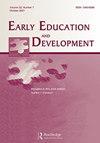Student-Teacher Ethnoracial Matching in the Earliest Grades: Benefits for Executive Function Skills?
IF 2.1
3区 教育学
Q1 EDUCATION & EDUCATIONAL RESEARCH
引用次数: 1
Abstract
The benefits of student-teacher ethnoracial matching on student outcomes—ranging from academic achievement to postsecondary attainment—are well documented. Yet, we know far less about the role of student-teacher ethnoracial matching in the earliest grades school and on less about effects on non-academic outcomes. The purpose of this study is to advance our understanding of student-teacher ethnoracial matching in early elementary school by exploring two executive function outcomes – working memory and cognitive flexibility. Drawing on data from the Early Childhood Longitudinal Study – Kindergarten Class of 2011, our findings suggest student-teacher ethnoracial matching benefits on working memory skills, though not cognitive flexibility. Observed associations for working memory are of similar size to those for academic achievement outcomes and are largest for Black and Latinx students. Abstract The benefits of student-teacher ethnoracial matching on student outcomes—ranging from academic achievement to postsecondary attainment—are well documented. Yet, we know far less about the role of student-teacher ethnoracial matching in the earliest grades school and on less about effects on non-academic outcomes. The purpose of this study is to advance our understanding of student-teacher ethnoracial matching in early elementary school by exploring two executive function outcomes – working memory and cognitive flexibility. Drawing on data from the Early Childhood Longitudinal Study – Kindergarten Class of 2011, our findings suggest student-teacher ethnoracial matching benefits on working memory skills, though not cognitive flexibility. Observed associations for working memory are of similar size to those for academic achievement outcomes and are largest for Black and Latinx students.小学低年级师生民族匹配:对执行功能技能的益处?
师生种族匹配对学生成绩的好处——从学术成就到高等教育成就——都有充分的证明。然而,我们对学生-教师种族匹配在小学低年级的作用知之甚少,对非学业成绩的影响也知之甚少。摘要本研究旨在探讨工作记忆与认知弹性这两个执行功能的结果,以增进我们对小学早期师生族群匹配的了解。根据2011年幼儿园早期儿童纵向研究的数据,我们的研究结果表明,学生与教师的种族匹配对工作记忆技能有好处,尽管对认知灵活性没有好处。观察到的工作记忆与学业成绩之间的关联类似,黑人和拉丁裔学生之间的关联最大。学生-教师种族匹配对学生成绩的好处-从学术成就到高等教育成就-都有很好的记录。然而,我们对学生-教师种族匹配在小学低年级的作用知之甚少,对非学业成绩的影响也知之甚少。摘要本研究旨在探讨工作记忆与认知弹性这两个执行功能的结果,以增进我们对小学早期师生族群匹配的了解。根据2011年幼儿园早期儿童纵向研究的数据,我们的研究结果表明,学生与教师的种族匹配对工作记忆技能有好处,尽管对认知灵活性没有好处。观察到的工作记忆与学业成绩之间的关联类似,黑人和拉丁裔学生之间的关联最大。
本文章由计算机程序翻译,如有差异,请以英文原文为准。
求助全文
约1分钟内获得全文
求助全文
来源期刊

Early Education and Development
Multiple-
CiteScore
5.50
自引率
10.30%
发文量
78
期刊介绍:
Early Education and Development (EE&D) is a professional journal for those involved in educational and preschool services and research related to children and their families: early education supervisors, school psychologists, daycare administrators, child development specialists, developmental and child clinical psychologists, and special education administrators. It is designed to emphasize the implications for practice of research and solid scientific information. The age range focused upon is preschool through the primary grades. EE&D is a connecting link between the research community in early education and child development and school district early education programs, daycare systems, and special needs preschool programs.
 求助内容:
求助内容: 应助结果提醒方式:
应助结果提醒方式:


